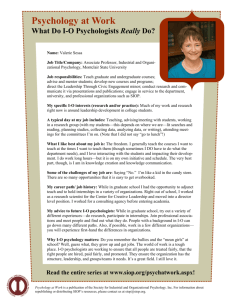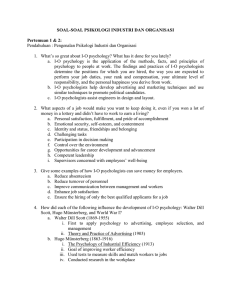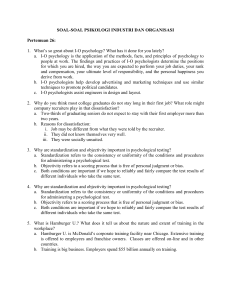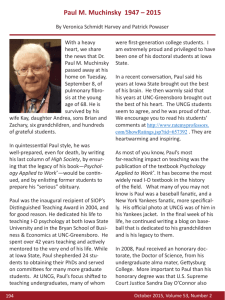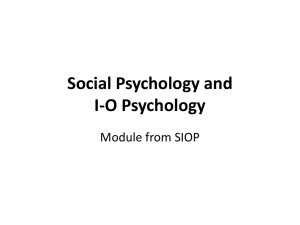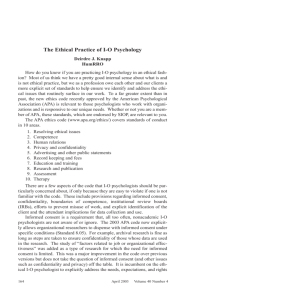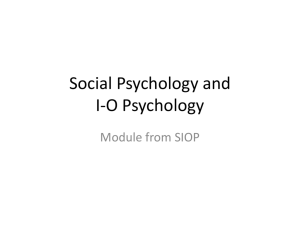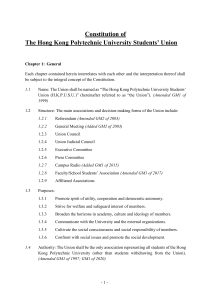IO Psychology Focuses on the Workplace Maximizing Human
advertisement
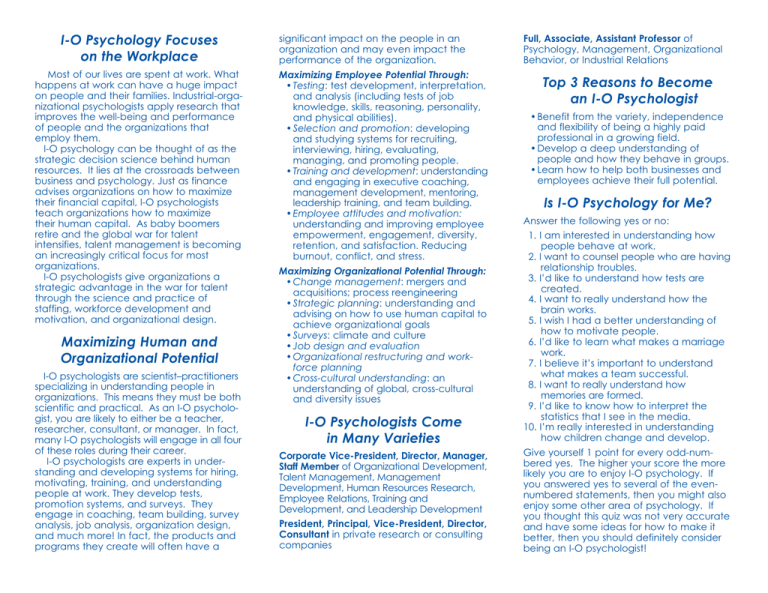
I-O Psychology Focuses on the Workplace Most of our lives are spent at work. What happens at work can have a huge impact on people and their families. Industrial-organizational psychologists apply research that improves the well-being and performance of people and the organizations that employ them. I-O psychology can be thought of as the strategic decision science behind human resources. It lies at the crossroads between business and psychology. Just as finance advises organizations on how to maximize their financial capital, I-O psychologists teach organizations how to maximize their human capital. As baby boomers retire and the global war for talent intensifies, talent management is becoming an increasingly critical focus for most organizations. I-O psychologists give organizations a strategic advantage in the war for talent through the science and practice of staffing, workforce development and motivation, and organizational design. Maximizing Human and Organizational Potential I-O psychologists are scientist–practitioners specializing in understanding people in organizations. This means they must be both scientific and practical. As an I-O psychologist, you are likely to either be a teacher, researcher, consultant, or manager. In fact, many I-O psychologists will engage in all four of these roles during their career. I-O psychologists are experts in understanding and developing systems for hiring, motivating, training, and understanding people at work. They develop tests, promotion systems, and surveys. They engage in coaching, team building, survey analysis, job analysis, organization design, and much more! In fact, the products and programs they create will often have a significant impact on the people in an organization and may even impact the performance of the organization. Maximizing Employee Potential Through: • Testing: test development, interpretation, and analysis (including tests of job knowledge, skills, reasoning, personality, and physical abilities). • Selection and promotion: developing and studying systems for recruiting, interviewing, hiring, evaluating, managing, and promoting people. • Training and development: understanding and engaging in executive coaching, management development, mentoring, leadership training, and team building. • Employee attitudes and motivation: understanding and improving employee empowerment, engagement, diversity, retention, and satisfaction. Reducing burnout, conflict, and stress. Maximizing Organizational Potential Through: • Change management: mergers and acquisitions; process reengineering • Strategic planning: understanding and advising on how to use human capital to achieve organizational goals • Surveys: climate and culture • Job design and evaluation • Organizational restructuring and workforce planning • Cross-cultural understanding: an understanding of global, cross-cultural and diversity issues I-O Psychologists Come in Many Varieties Corporate Vice-President, Director, Manager, Staff Member of Organizational Development, Talent Management, Management Development, Human Resources Research, Employee Relations, Training and Development, and Leadership Development President, Principal, Vice-President, Director, Consultant in private research or consulting companies Full, Associate, Assistant Professor of Psychology, Management, Organizational Behavior, or Industrial Relations Top 3 Reasons to Become an I-O Psychologist • Benefit from the variety, independence and flexibility of being a highly paid professional in a growing field. • Develop a deep understanding of people and how they behave in groups. • Learn how to help both businesses and employees achieve their full potential. Is I-O Psychology for Me? Answer the following yes or no: 1. I am interested in understanding how people behave at work. 2. I want to counsel people who are having relationship troubles. 3. I’d like to understand how tests are created. 4. I want to really understand how the brain works. 5. I wish I had a better understanding of how to motivate people. 6. I’d like to learn what makes a marriage work. 7. I believe it’s important to understand what makes a team successful. 8. I want to really understand how memories are formed. 9. I’d like to know how to interpret the statistics that I see in the media. 10. I’m really interested in understanding how children change and develop. Give yourself 1 point for every odd-numbered yes. The higher your score the more likely you are to enjoy I-O psychology. If you answered yes to several of the evennumbered statements, then you might also enjoy some other area of psychology. If you thought this quiz was not very accurate and have some ideas for how to make it better, then you should definitely consider being an I-O psychologist!
